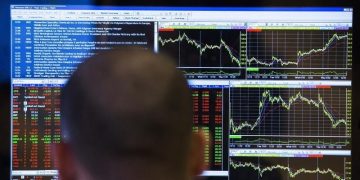- Nate Hoskin is one of the youngest CFPs in the US after getting certified at 22 in early 2021.
- He works largely with younger clients, whom he says need to radically rethink retirement planning.
- He suggests side hustles and passive income to clients, as opposed to 401(k)s and traditional IRAs.
When Nate Hoskin, a 24-year-old certified financial planner, saw a statistic that only 4.3% of all CFPs were under the age of 30, he called the Certified Financial Planner Board of Standards to ask if there were any planners younger than him in its records. After that call, he realized that he was one of the youngest financial planners in the entire country — if not the youngest.
One of the reasons the occupation skews older is the educational and work-experience requirements to become certified. Any prospective CFP needs to have completed a bachelor’s degree, additional coursework that usually takes a year, and either 6,000 hours of financial planning or 4,000 hours of apprenticeship under a certified planner.
But Hoskin experienced a couple of unique circumstances that allowed him to qualify at a much younger age.
“I was working my junior and senior year of college directly under a CFP,” Hoskin said. “My first job was with a quantitative hedge fund that I didn’t really like, and so I transitioned over to wealth management and could do the apprenticeship track. I was able to start the process really quickly.”
Then, right around the time Hoskin began studying for the exam in March 2020, the COVID-19 pandemic shut everything down.
“I had nothing going on,” he said. “I wasn’t allowed to go into the office. I had no social life.”
So he decided to spend his pandemic days hunkering down on his financial-planning coursework and completed the course — which typically takes 12 months — over a period of about three months.
“I probably studied for over a thousand hours on my own,” Hoskin said. He took the board exam in April 2021 and passed, achieving certification at the age of 22.
When asked why he wanted to be a financial planner, Hoskin said he was initially motivated because he figured that even if he didn’t professionally become a planner, he could still use this knowledge to his own benefit. He added that becoming certified equipped him with “an insane amount of knowledge around very complicated products, as well as trust systems taxes.”
Experiencing all the economic uncertainty of the pandemic and seeing many of his friends get laid off earlier in the pandemic only strengthened his resolve to keep learning about wealth management, not only for himself but also for people who need help as they try to navigate the current economic circumstances.
“People need someone who can help them walk through these financial decisions that they’re making,” Hoskin said. “That was why I came over from the more analytics side. I was in portfolio management and quantitative analytics in college.”
Ultimately, Hoskin ended up opening his own firm, Hoskin Capital, and gears a lot of his educational material and outreach toward younger clients. He has about 200,600 followers on TikTok, where he posts informational videos about retirement, investing, and wealth management as a financial planner.
When asked what he thought was the biggest financial issue facing his generation, he said that two things were at the front of his mind: work autonomy and retirement planning.
Gen Z isn’t going to experience work or retirement the way that other generation have
Hoskin said retirement was going to look much different for Gen Z for a variety of reasons.
“We do not trust that we will receive Social Security or see a situation in which we can really count on that income,” Hoskin said, adding that those in his generation were also likely to live longer than those in any generation that came before.
“So when we’re looking at the more traditional retirement-planning strategies, they don’t work for us because the amount of time you would expect to spend working and the amount of time you would expect to spend retired are becoming closer and closer to the same length,” Hoskin said. “It’s really hard to effectively create a retirement strategy around that.”
Ultimately, he said, this leaves many workers in the Gen Z cohort feeling like their retirement options are both limited and bleak.
“Work for longer? No thanks — pass,” Hoskin said. “And anyway, we do not have the same standards for what would be expected of us as a workforce because I don’t know many people who are planning to work in their current gig for the next 40 years. We’re not incentivized to do that because pensions have gone the way of just about everything else.”
For workers his age, he said, it has become very clear that retirement planning is the responsibility of the individual, not the employer. That should lead younger workers to ask themselves questions about where they want to work.
Gen Z workers have to carve individual career and retirement-planning paths to keep up with changing times
Hoskin said he thought it’s “laughable” when it’s suggested that Gen Z simply doesn’t want to work. What is happening, according to him, is that younger workers are measuring the value of their time and labor against what their companies offer them and planning according to their needs and interests.
“We are creating an entirely new approach to careers,” Hoskin said. “Because if you’re going to tell me that I need to work until I’m 70 or 75, I need to be doing something that really feeds me.”
Ultimately, Hoskin said he thought that for many people, this would mean working for themselves and developing multiple streams of income. This will also serve them in retirement because by working for themselves and having multiple streams of income, it becomes easier to replace income as you decide to work less or quit the traditional 9-to-5 workforce.
“The way that people for the last 100 years or so have been replacing income has been by saving up as much money as possible and investing that into something that they can withdraw from in retirement,” Hoskin said, adding that this was much less effective now because “it’s really hard to save up enough and be able to stretch it for long enough.”
“The main thing that I’ve been communicating to my clients is that they need to replace income with something else,” Hoskins said, adding that he strongly encouraged his clients to consider avenues other than a 401(k) or traditional individual retirement account when it came to planning for retirement. He said that developing independent side hustles and investing in things like real estate would help them get ahead of the curve.
“People are making a whole bunch of money doing things that they would like to do outside of the traditional corporate structure,” Hoskins said. “I think that’s how people will plan for retirement going forward.”
Read the full article here








